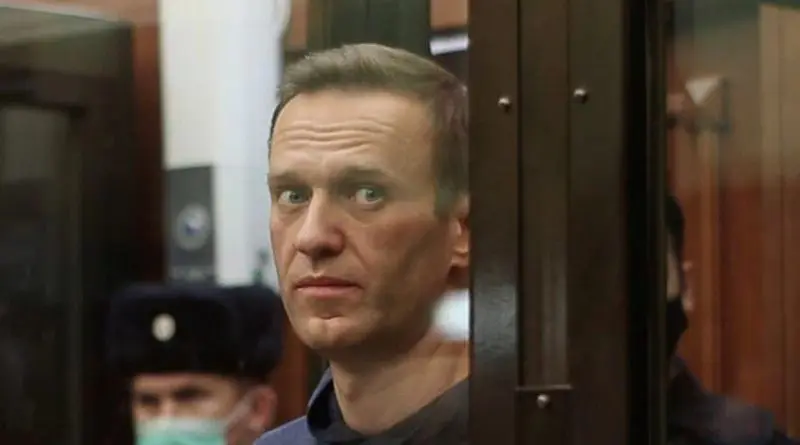Russia: Navalny Removed From Prison Colony, Whereabouts Unclear
By EurActiv
(EurActiv) — Russian opposition politician Alexei Navalny has been removed from the IK-6 penal colony in the Vladimir region, east of Moscow, and his current whereabouts are not known, his allies said on Monday (11 December).
Navalny aides have been preparing for his possible transfer to a harsher-regime colony after he was sentenced in August to an additional 19 years in prison.
Navalny’s spokeswoman Kira Yarmysh said staff at the IK-6 colony in the town of Melekhovo had told his lawyer waiting outside that the opposition leader was no longer among its inmates.
“Where they have taken him, they refuse to say,” she said on social media platform X.
The process of transferring prisoners by rail across Russia’s vast territory can take weeks, with relatives and family unable to obtain information about their whereabouts and wellbeing until they reach their destination.
Navalny’s lawyers have been unable to contact him since last Tuesday.
His aide Lyubov Sobol told Reuters last week that his supporters feared he was being transferred to a new penal colony, and that the timing was linked to the start of a presidential election campaign in which Vladimir Putin has said he will seek another six-year term.
“They are so afraid of Navalny, who is in prison, who has limited correspondence rights, can’t see his family and so on, that during the period when Putin would declare, they decided to just cut off Navalny as far as possible from the outside world. God forbid he should make some kind of statement,” she said.
Navalny’s supporters cast him as a Russian version of South Africa’s Nelson Mandela who will one day be freed from jail to lead the country.
Russian authorities view Navalny and his supporters as extremists with links to Western intelligence agencies intent on trying to destabilise Russia. Putin has warned the West that any meddling inside Russia will be considered an act of aggression.
Navalny’s strategy
With the Kremlin in full control of state media and able to decide who can and cannot run, the Navalny camp says this is not a real election. But it sees the campaign window as a rare opportunity to draw Russians into a political conversation and convince them that Russia’s main problems are of Putin’s making.
“Of course it’s impossible to beat Putin in the ‘elections’,” Navalny aide Leonid Volkov told Reuters. “The aim of our campaign is to change the political agenda in Russia.”
During an election campaign when people are focused on politics and expecting promises and solutions, it will be harder for the Kremlin to avoid difficult topics, he said.
“Putin is vulnerable because he does not have answers today to the questions that really worry people. These are the questions of an exit strategy for the war – when and how it should end and when the soldiers will return home – and the questions of destitution, poverty, corruption, financial credits and all the rest.”
The Kremlin says Putin will win another six-year term because he commands overwhelming support across Russian society, with opinion poll ratings of around 80%.
So far only three people have declared their intention to run against him. Two are low-profile figures, Boris Nadezhdin and Yekaterina Duntsova, who may struggle to gather the 300,000 signatures required to support their candidacies. The third, nationalist Igor Girkin, is in jail awaiting trial on a charge of inciting extremist activity.
Other possible candidates who have yet to declare include Communist leader Gennady Zyuganov and liberal Grigory Yavlinsky, both political veterans and serial election losers.
‘NotPutin’
With the line-up still unclear, the Navalny camp has launched its campaign by simply urging Russians to vote against the incumbent.
“We don’t have our own candidate. We had a candidate, Navalny, and they refused to register him, tried to kill him and put him in prison. Now we have, so to speak, a collective candidate ‘against Putin’,” said Lyubov Sobol, a close Navalny associate who, like Volkov, is on an official list of “terrorists and extremists” and is now based outside Russia.
The opposition is seeking volunteers from among the hundreds of thousands of people who have fled Russia since the start of the war and asking them to cold-call voters – ideally as many as 100 each, Sobol said in a telephone interview.
Many people would be scared and put the phone down, but others could be persuaded to talk, she said.
On its website NePutin (NotPutin).org, the Navalny team also calls for volunteers to spread videos and campaign messages online, and to stick up leaflets and scrawl graffiti in the streets – what Sobol described as “partisan” tactics.
“Putin’s task is to make sure these elections go as smoothly and calmly as possible, without any strain on the nerves. Our task is the opposite,” she said.
Within hours of parliament announcing the 17 March election last Thursday, the Navalny camp had fired its first campaign shot. It posted photos on social media of giant blue billboards it had placed in major cities, with an innocent-looking new year greeting to Russians. Underneath was a QR code leading to the NotPutin website.
The stunt showed the ingenuity of Navalny’s tech-savvy team. But the impact was brief, as authorities took down the billboards and blocked access to the site.

